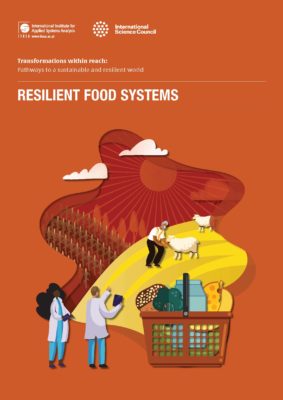Contagious hope
COVID-19 exposed our vulnerability. On top of the millions of deaths, its indirect effects have been paralyzing. The pandemic has halted health services such as childhood vaccination and cancer screening; increased food-related insecurity; and slowed efforts to bring clean energy to developing nations. Poorer countries and sections of society have been hit hardest by economic and social hardship, and around 100 million more people lived in extreme poverty in 2020 because of COVID-19.
The crisis also highlighted the compound and cascading nature of global risk. Governments have had to deal with a host of extreme events, from earthquakes to flooding to social unrest, along with COVID-19, straining the agencies that deal with such crises.
Systems analysis is the only approach that can investigate such compound problems and how to balance the objectives of resilience, sustainability, and equity. This prompted IIASA and the ISC to join forces to bring a transdisciplinary systems perspective to the COVID crisis. About 300 international experts from academia, business, NGOs, and government pooled their knowledge to identify systemic changes triggered by the crisis and how to guide recovery towards long-term sustainable development. The initiative focused on four interlinked areas: governance, science, energy, and food.
A fragmented approach to governance has hampered responses to the crisis. The initiative’s recommendations include that the ongoing reform process should ensure that separate UN agencies work in a coordinated way, while governments should be empowered to take a systems view. A global dialogue could engage policymakers, civil society, the private sector, and the scientific community to improve understanding of compound and systemic risks; while a science-based tracking mechanism could assess how recovery packages align with the Sustainable Development Goals.
The science system should become more agile, reliable, and policy-relevant. One option to improve agility would be setting up a system of expert research teams that can be activated on demand. The initiative recommends open science methods to restore trust and more widespread collaboration to capture the diversity of global contexts.
In terms of energy, we need to look beyond production and focus on cutting demand, for example, by repurposing urban spaces to provide for human wellbeing while reducing environmental footprints. This can build on innovations adopted during the COVID crisis. The pandemic also underlines the entanglement of human and natural systems, especially in the field of food and nutrition. There is an urgent need to balance today’s focus on efficiency of supply with a new emphasis on resilience and equity, to ensure that the future food system can deliver universal security and empower the most vulnerable groups.
COVID could become a crucible of reform. Governments, businesses, and citizens have been willing to respond constructively to the COVID crisis and take radical action. This is cause for optimism that we can undertake the transformative changes we need for a safe and healthy planet.





